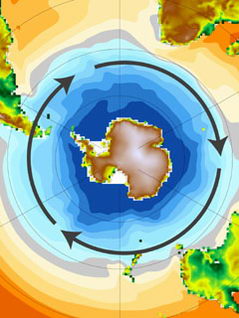
The Earth is getting warmer, and scientists mostly agree that humans bear some blame. It’s easy to see how global warming could flood cities and ruin harvests. More recently, researchers raised the alarm that our planet could also assist the spread of infectious disease by providing a more suitable climate for parasites and spreading the range of tropical pathogens.
Effects could be even more dramatic. At present, atmospheric gases trap enough heat close to the surface to keep things comfortable. Increase the global temperature a bit, however, and there could be a bad feedback effect, with water evaporating faster, freeing water vapor that traps more heat, which drives carbon dioxide from the rocks, which drives temperatures still higher.
However, the new finding surprised the scientists. The Southern Hemisphere westerly winds have moved southward in the last 30 years. A new climate model predicts that as the winds shift south, they can do a better job of transferring heat and carbon dioxide from the surface waters surrounding Antarctica into the deeper, colder waters. But, it will slow global warming. It won’t reverse or stop it, but it will slow the rate of increase.
Previous climate models did not have the winds properly located. In simulations of present-day climate, those models distorted the ocean’s response to future increases in greenhouse gases. Because these winds have moved poleward, the Southern Ocean around Antarctica is likely to take up 20 percent more carbon dioxide than in a model where the winds are poorly located
More heat stored in the ocean means less heat stored in the atmosphere. That’s also true for carbon dioxide, the major greenhouse gas.
Here it opens a new field of investigation. If more carbon dioxide and heat goes into the ocean, the consequences will be more alarming. As the atmosphere warms, storing more heat in the ocean will cause sea levels to rise even faster as the warmed water expands. Adding more CO2 to the oceans will change their chemistry, making the water more acidic and less habitable for some marine organisms.
Via: Physorg

